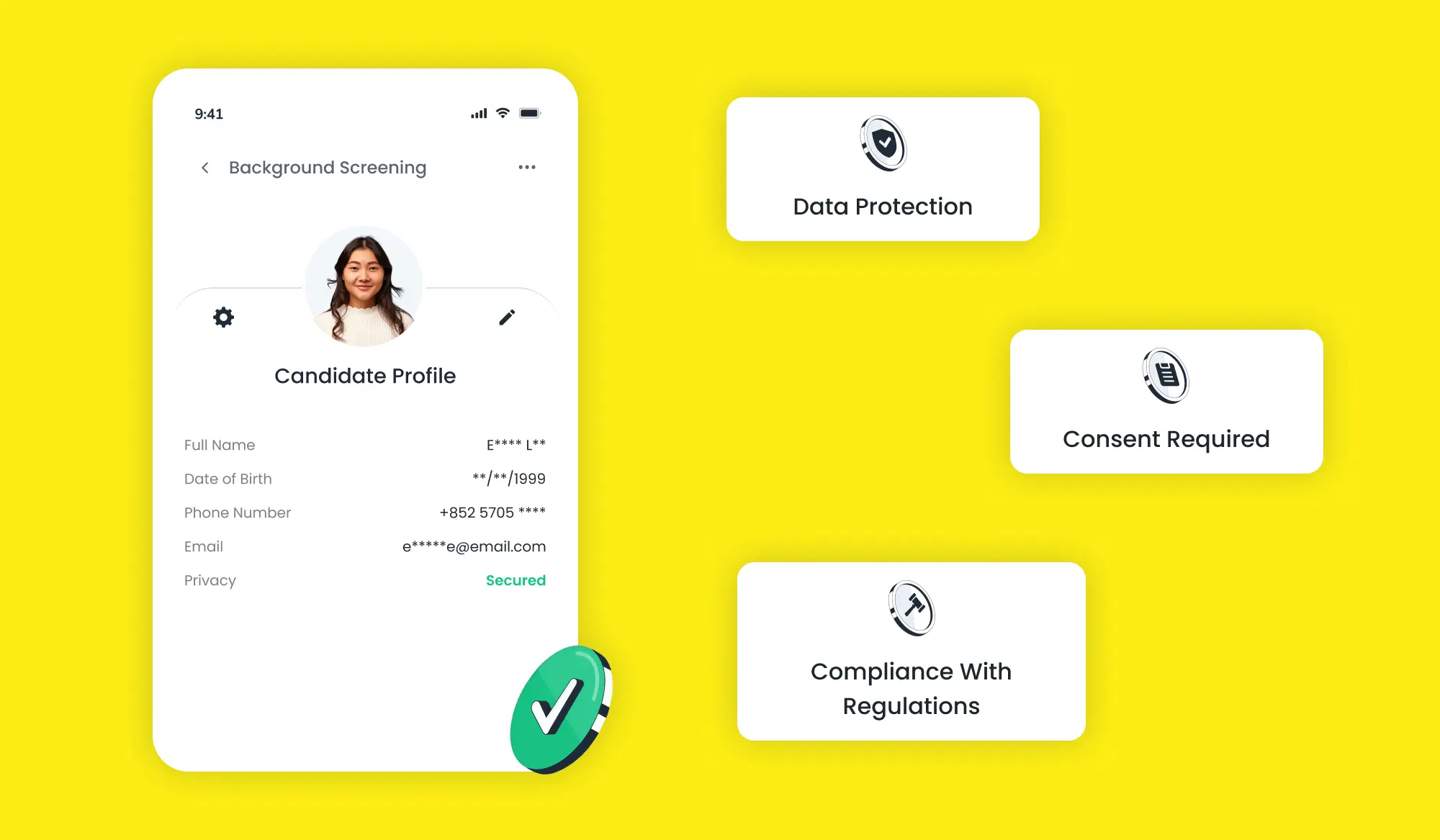Introduction
Hiring the right candidate requires more than resumes and interviews; it involves trust. That’s why background checks for employment are now a standard part of the hiring process. A strong resume and a confident interview can create a great first impression, but are they enough to trust someone with sensitive company data, finances, or customer interactions? No. This is where background checks for employment come in. They’re not just about filtering out dishonest candidates; they’re about safeguarding business reputation, complying with regulations, and ensuring a safe workplace through proper employee background verification.
In this guide, we’ll break down the entire process, from understanding what a background check means to carrying it out step by step.
What Are Background Checks for Employment?
Background checks for employment, also known as employment background screening, are the process of validating a candidate’s personal, professional, and sometimes financial history. Employers use these checks to verify that the details provided by a candidate are accurate and to identify any potential red flags that may impact their suitability for a role.
This can include checks on employment history, education, criminal records, financial stability, and reference feedback, among other factors. Essentially, it answers one big question for employers: “Is this person who they claim to be, and can I trust them with this job?” In other words, employee background verification helps employers make data-driven hiring decisions with confidence.
Why Employers Should Conduct Background Checks for Employment
Skipping background checks might save a few days during the hiring process, but the long-term risks are far more significant. Employers who invest in thorough screening enjoy multiple benefits:
Financial and data protection: The cost of a wrong hire can be staggering, sometimes up to three times the employee’s annual salary when considering recruitment, training, and potential damages. Beyond financial loss, many roles involve access to sensitive company data or intellectual property. Background checks for employment help mitigate risks related to fraud, theft, or data breaches, protecting both your finances and critical information.
Preventing bad hires: A candidate with fake credentials, a hidden criminal record, or a history of workplace misconduct could cause serious operational, financial, and legal problems. Background checks help ensure that candidates are who they claim to be, reducing turnover and avoiding costly mistakes.
Ensuring regulatory compliance: Certain industries, including finance, healthcare, education, and government sectors, are legally required to conduct background checks for employment. Non-compliance can lead to fines, legal penalties, and even suspension of business licenses.
Safeguarding reputation and stakeholder confidence: A single unethical hire can severely damage customer trust, public perception, and overall brand credibility. Thorough background checks demonstrate due diligence in hiring, protecting not only the company but also employees and everyone involved in its operations. This practice also builds trust with investors and stakeholders who value strong risk management and responsible human capital practices.
Background checks for employees aren’t just a formality; it’s a strategic investment. By carefully vetting candidates, employers protect their people, reputation, finances, and long-term growth. In a competitive job market, a thorough background check process is a critical pillar of responsible and effective hiring.
Who Needs Background Checks: Industries and Key Roles
While background checks benefit every employer, there are industries and roles where checks are non-negotiable due to legal, compliance, or safety reasons.
Banking & Financial Services
- Roles: Investment bankers, traders, financial analysts, accountants, auditors, compliance officers, loan officers, cashiers, and treasury staff.
- Why: Employees handle sensitive financial data and large sums of money, making fraud prevention and regulatory compliance essential.
Healthcare & Pharmaceuticals
- Roles: Doctors, nurses, pharmacists, lab technicians, clinical researchers, caregivers, and hospital administrators.
- Why: Patient safety, malpractice prevention, and screening of professional licenses are crucial.
Education & Childcare
- Roles: Teachers, professors, tutors, daycare workers, sports coaches, school bus drivers, and administrative staff.
- Why: Protecting children and students from harm requires strict criminal and reference checks.
IT, Cybersecurity & Data-Sensitive Roles
- Roles: Software developers, system administrators, data analysts, cybersecurity engineers, IT consultants, and employees with access to client databases.
- Why: Protects intellectual property and prevents misuse of sensitive information.
Government, Defense & Law Enforcement
- Roles: Civil servants, defense contractors, police officers, intelligence officers, and judiciary staff.
- Why: National security, integrity, and public trust demand rigorous background screening.
Logistics, Aviation & Transportation
- Roles: Pilots, cabin crew, drivers, ground staff, shipping/port employees, warehouse managers, and delivery staff.
- Why: Roles directly affect passenger/public safety and require medical, criminal, and security clearance.
Hospitality & Customer-Facing Roles
- Roles: Hotel staff, concierge, event managers, security staff, and customer support representatives.
- Why: These employees have direct access to guests, personal belongings, and sensitive data.
Manufacturing, Energy & Construction
- Roles: Engineers, plant operators, safety officers, contractors, and field technicians.
- Why: Workplace safety, compliance with labor laws, and avoiding liability in hazardous environments.
Note: It’s not just the industry but the role-specific risk that determines the level of background verification needed. For example, a financial controller in a bank undergoes more stringent checks than a marketing assistant, even within the same organization.
Types of Background Checks for Employment
There are several types of background checks for employment, often referred to as pre-employment screening, that employers can choose from based on the nature of the job and level of responsibility.
Employment background checks aren’t one-size-fits-all. Employers can select the type of checks based on role requirements. There are many types of checks available, but some are more common and widely used, such as:
Identity (ID) Check: Confirms government-issued ID details.
Employment Check: Ensures past roles, tenure, and responsibilities match.
Education Check: Validates degrees, diplomas, and certifications.
Criminal Record Check: Reviews court, police, or government databases.
Reference Check: Gathers insights from previous managers or colleagues.
Credit/Financial Check: For roles involving financial responsibility.
Professional License Check: Confirms the validity of medical, legal, or technical licenses.
Global Sanctions & Watchlist Screening: Critical for compliance in multinational operations.
How to Do an Employment Background Check?
Conducting thorough background checks for employment is a vital step in the pre-employment screening process to ensure that hiring decisions are accurate, compliant, and fair. To ensure compliance and consistency, employers should follow these steps when performing background checks for employment;
Step 1: Define the scope: Before starting, identify which types of checks are relevant to the position. For example, finance roles may require credit and employment history checks, IT positions may need identity and criminal checks, and healthcare roles often require license validation. Defining the scope ensures resources are focused and the process is efficient.
Step 2: Obtain candidate consent: Always inform candidates about the checks that will be conducted and secure their written permission. This step is critical for compliance with data privacy laws and maintaining transparency in the hiring process. Candidates are more likely to engage positively when they understand the purpose of the checks.
Step 3: Collect accurate candidate information: Gather all necessary details, including resumes, government-issued IDs, academic certificates, and professional references. Accurate information at this stage reduces delays, prevents errors, and ensures that the screening process can proceed smoothly.
Step 4: Partner with a reliable screening provider: Working with a trusted background screening agency ensures access to verified databases, expert knowledge, and efficient employee background verification across multiple data sources. Professional agencies can conduct checks faster, provide detailed reports, and maintain compliance with regulations, reducing the employer’s administrative burden.
Step 5: Conduct the checks: Carry out the relevant checks according to the defined scope. This may include employment history, educational qualifications, criminal records, financial/credit history, professional licenses, or global watchlists. Thorough background checks for employment help reduce the risk of fraud, misrepresentation, and other liabilities.
Step 6: Review the findings: Examine the results carefully to identify discrepancies, inconsistencies, or potential red flags. Assess the severity and relevance of any findings in the context of the role, taking into account the responsibilities and level of access involved.
Step 7: Make a fair and informed decision: Use the findings to make a hiring decision that balances organizational risk with fairness to the candidate. Ensure compliance with employment laws, document the process, and communicate the outcome professionally, keeping the hiring process transparent and consistent.
How Employers Should Handle Negative Background Check Results
Not every discrepancy found during background checks for employment should lead to automatic rejection. Employers can follow these guidelines to make fair and informed hiring decisions:
Evaluate relevance: Determine whether the issue directly impacts the responsibilities of the role. For example, a minor traffic violation may not affect a software developer, but could be critical for a driver.
Consider recency: Assess how long ago the incident occurred. A minor issue from 10 years ago may have little bearing on the candidate’s current suitability.
Seek clarification: Provide candidates an opportunity to explain the discrepancy. Context and honesty can make a significant difference in evaluating risk.
Document decisions: Keep detailed records of the findings and the rationale for your decision. This ensures compliance, transparency, and protection in case of disputes.
A balanced approach like this helps organizations hire responsibly, protecting both business interests and candidates’ rights.
Legal Considerations When Conducting Background Checks for Employment
Background checks are only effective when conducted within legal and ethical boundaries. Employers should follow these best practices:
Comply with data privacy laws: Ensure checks comply with regulations (such as the PDPO in Hong Kong) or other relevant local labor and privacy laws in the country where the checks are conducted, as well as any contractual obligations with the candidate. Improper handling of personal data or conducting checks without proper consent may result in legal penalties.
Obtain written consent: Always secure explicit consent from candidates before initiating any screening process. Transparency builds trust and ensures compliance.
Avoid discrimination: Make hiring decisions based solely on role-related criteria. Avoid bias related to age, gender, religion, race, or other protected characteristics.
Use licensed vendors: Partner with reputable and licensed agencies for criminal, financial, and professional verification to ensure accuracy and legitimacy.
Maintain confidentiality: Treat all candidate information as strictly confidential, sharing results only with authorized personnel involved in hiring decisions.
Following these best practices ensures that employment background checks are ethical, legal, and reliable, while protecting both the organization and the candidate.
FAQs on Background Checks For Employment
Checks should be done after a conditional offer is made, but before onboarding. Some industries may require ongoing or periodic re-checks.
No. Each country has its own data privacy laws, reporting practices, and limitations. Global hiring requires tailored checks for each jurisdiction.
Yes, but the employer should evaluate the severity, relevance, and recency of the issue before making a final decision. It’s best practice to allow the candidate to explain discrepancies.
Some industries, such as finance, healthcare, and education, mandate periodic re-screening due to regulatory requirements. For other sectors, conducting a background check at the time of hiring is usually sufficient unless the employee’s role or responsibilities change significantly. However, ongoing monitoring is considered a best practice, especially for positions with high access to sensitive data, finances, or vulnerable populations, as it helps identify risks that may arise during employment.
Not necessarily. With the right partner and planning, most checks can be completed quickly without slowing down the onboarding process.
Costs vary depending on the type of check and the country. Basic checks may take 2–3 business days, while more complex checks (like international education or criminal history) can take 1–3 weeks. While there is an upfront cost, the cost of not doing a background check is far greater; a bad hire can lead to compliance penalties, financial losses, reputational damage, and even workplace safety risks. In the long run, background checks save employers money and protect the business.
Roles in finance, healthcare, childcare, education, government, and regulated industries often mandate strict background checks.
Yes, but the scope differs. For example, some countries limit access to criminal records, while others permit only verification for employment and education purposes.
Employers can usually withdraw the job offer since background checks are a standard hiring requirement.
No. They confirm factual data (identity, employment, education, records) but don’t predict future behavior or guarantee performance.
Conclusion
In today’s competitive and regulated business environment, Background checks for employment are no longer optional; they’re essential. Employers who implement structured and compliant background checks not only minimize risk but also build a trustworthy workplace culture.
By following the step-by-step process outlined above, businesses can ensure that their hiring decisions are informed, fair, and future-proof.
Make Smarter Hiring Decisions Today!
Don’t risk your business with bad hires. Get started with background checks for employment that are fast, compliant, and reliable.













